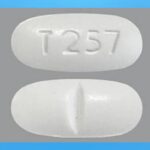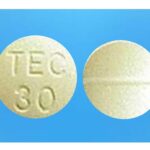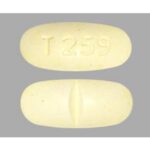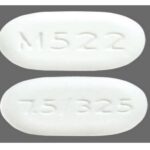WES 303 Pill: Uses, Dosage, Side Effects, Addiction

The blue capsule-shaped pill with imprint WES 303 has been identified as Acetaminophen and Hydrocodone Bitartrate acetaminophen 325 mg / hydrocodone bitartrate 10 mg. It is supplied by Eywa Pharma Inc.. Hydrocodone blocks the receptors on nerve cells in the brain that give rise to the sensation of pain.
Acetaminophen is a non-narcotic analgesic (pain reliever) and antipyretic (fever reducer). Acetaminophen works by elevating the threshold to pain, that is, in order for pain to be felt, greater stimulation of the nerves responsible for the sensation of pain is necessary. It reduces fever through its action on the temperature-regulating center of the brain. Frequently, hydrocodone and acetaminophen are combined to achieve pain relief. WES 303 pill is used as a pain reliever. It is used to treat moderate to severe pain. This medicine may be used for other purposes; ask your health care provider or pharmacist if you have questions.
WES 303pill is a prescription only medication that belongs to the drug class narcotic analgesic combinations. It is classified as a Schedule 2 controlled substance under the Controlled Substance Act (CSA.)
What should I tell my health care provider before I take WES 303 pill?
They need to know if you have any of these conditions:
• brain tumor
• Crohn’s disease, inflammatory bowel disease, or ulcerative colitis
• drug abuse or addiction
• head injury
• heart or circulation problems
• if you often drink alcohol
• kidney disease or problems going to the bathroom
• liver disease
• lung disease, asthma, or breathing problems
• an unusual or allergic reaction to acetaminophen, hydrocodone, other opioid analgesics, other medicines, foods, dyes, or preservatives
• pregnant or trying to get pregnant
• breast-feeding
How should I use WES 303 pill?
Take this medicine by mouth with a glass of water. Follow the directions on the prescription label. You can take it with or without food. If it upsets your stomach, take it with food. Do not take your medicine more often than directed.
A special MedGuide will be given to you by the pharmacist with each prescription and refill. Be sure to read this information carefully each time.
Talk to your pediatrician regarding the use of this medicine in children. Special care may be needed.
Overdosage: If you think you have taken too much of WES 303 pill, contact a poison control center or emergency room at once.
What if I miss a dose of WES 303 pill?
If you miss a dose, take it as soon as you can. If it is almost time for your next dose, take only that dose. Do not take double or extra doses.
What may interact with WES 303 pill?
This medicine may interact with the following medications:
• alcohol
• antiviral medicines for HIV or AIDS
• atropine
• antihistamines for allergy, cough and cold
• certain antibiotics like erythromycin, clarithromycin
• certain medicines for anxiety or sleep
• certain medicines for bladder problems like oxybutynin, tolterodine
• certain medicines for depression like amitriptyline, fluoxetine, sertraline
• certain medicines for fungal infections like ketoconazole and itraconazole
• certain medicines for Parkinson’s disease like benztropine, trihexyphenidyl
• certain medicines for seizures like carbamazepine, phenobarbital, phenytoin, primidone
• certain medicines for stomach problems like dicyclomine, hyoscyamine
• certain medicines for travel sickness like scopolamine
• general anesthetics like halothane, isoflurane, methoxyflurane, propofol
• ipratropium
• local anesthetics like lidocaine, pramoxine, tetracaine
• MAOIs like Carbex, Eldepryl, Marplan, Nardil, and Parnate
• medicines that relax muscles for surgery
• other medicines with acetaminophen
• other narcotic medicines for pain or cough
• phenothiazines like chlorpromazine, mesoridazine, prochlorperazine, thioridazine
• rifampin
This list may not describe all possible interactions. Give your health care provider a list of all the medicines, herbs, non-prescription drugs, or dietary supplements you use. Also tell them if you smoke, drink alcohol, or use illegal drugs. Some items may interact with your medicine.
What should I watch out for while using this medicine?
Tell your doctor or health care professional if your pain does not go away, if it gets worse, or if you have new or a different type of pain. You may develop tolerance to the medicine. Tolerance means that you will need a higher dose of the medicine for pain relief. Tolerance is normal and is expected if you take the medicine for a long time.
Do not suddenly stop taking your medicine because you may develop a severe reaction. Your body becomes used to the medicine. This does NOT mean you are addicted. Addiction is a behavior related to getting and using a drug for a non-medical reason. If you have pain, you have a medical reason to take pain medicine. Your doctor will tell you how much medicine to take. If your doctor wants you to stop the medicine, the dose will be slowly lowered over time to avoid any side effects.
There are different types of narcotic medicines (opiates). If you take more than one type at the same time or if you are taking another medicine that also causes drowsiness, you may have more side effects. Give your health care provider a list of all medicines you use. Your doctor will tell you how much medicine to take. Do not take more medicine than directed. Call emergency for help if you have problems breathing or unusual sleepiness.
Do not take other medicines that contain acetaminophen with this medicine. Always read labels carefully. If you have questions, ask your doctor or pharmacist.
If you take too much acetaminophen, get medical help right away. Too much acetaminophen can be very dangerous and cause liver damage. Even if you do not have symptoms, it is important to get help right away.
You may get drowsy or dizzy. Do not drive, use machinery, or do anything that needs mental alertness until you know how this medicine affects you. Do not stand or sit up quickly, especially if you are an older patient. This reduces the risk of dizzy or fainting spells. Alcohol may interfere with the effect of this medicine. Avoid alcoholic drinks.
The medicine will cause constipation. Try to have a bowel movement at least every 2 to 3 days. If you do not have a bowel movement for 3 days, call your doctor or health care professional.
Your mouth may get dry. Chewing sugarless gum or sucking hard candy, and drinking plenty of water may help. Contact your doctor if the problem does not go away or is severe.
What are the side effects of WES 303 pill ?
Side effects that you should report to your doctor or health care professional as soon as possible:
• allergic reactions like skin rash, itching or hives, swelling of the face, lips, or tongue
• breathing problems
• confusion
• redness, blistering, peeling or loosening of the skin, including inside the mouth
• signs and symptoms of low blood pressure like dizziness; feeling faint or lightheaded, falls; unusually weak or tired
• trouble passing urine or change in the amount of urine
• yellowing of the eyes or skin
Side effects that usually do not require medical attention (report to your doctor or health care professional if they continue or are bothersome):
• constipation
• dry mouth
• nausea, vomiting
• tiredness
This list may not describe all possible side effects. Call your doctor for medical advice about side effects. You may report side effects to FDA at 1-800-FDA-1088.
Where should I keep my medicine?
Keep out of the reach of children. This medicine can be abused. Keep your medicine in a safe place to protect it from theft. Do not share this medicine with anyone. Selling or giving away this medicine is dangerous and against the law.
Store at room temperature between 15 and 30 degrees C (59 and 86 degrees F).
This medicine may cause harm and death if it is taken by other adults, children, or pets. Return medicine that has not been used to an official disposal site. Contact the DEA at 1-800-882-9539 or your city/county government to find a site. If you cannot return the medicine, flush it down the toilet. Do not use the medicine after the expiration date.
NOTE: This sheet is a summary. It may not cover all possible information. If you have questions about this medicine, talk to your doctor, pharmacist, or health care provider.





